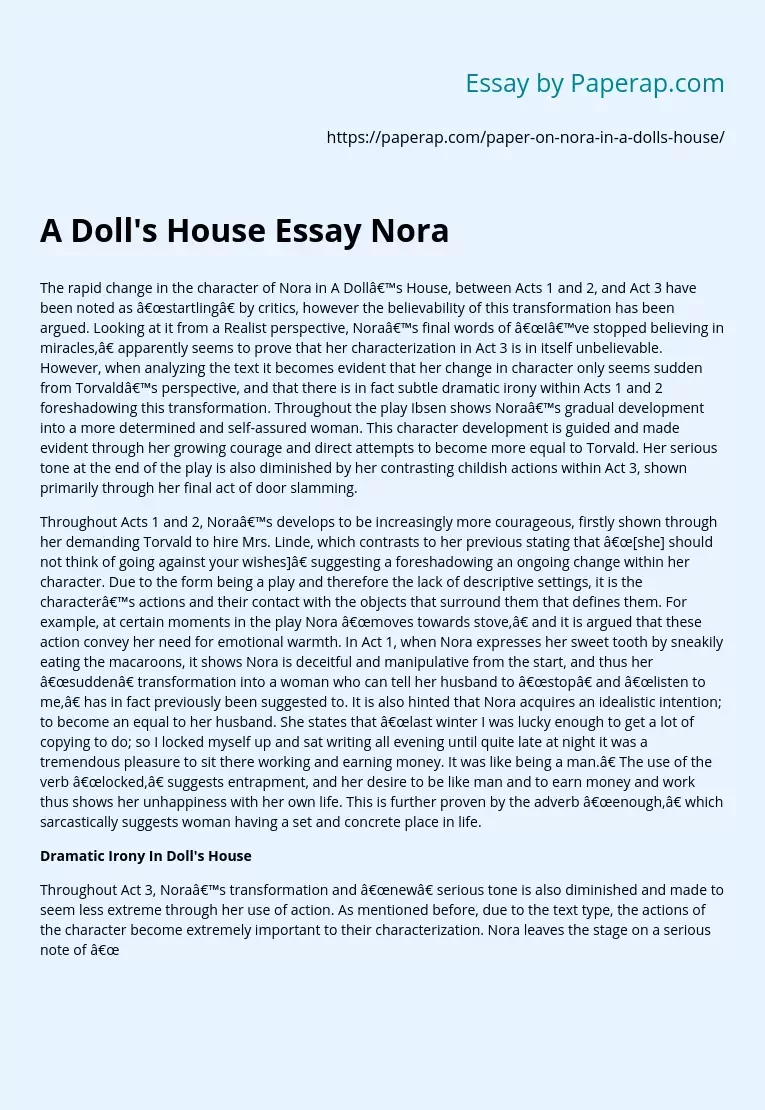A Doll's House Essay Nora
The rapid change in the character of Nora in A Doll’s House, between Acts 1 and 2, and Act 3 have been noted as “startling” by critics, however the believability of this transformation has been argued. Looking at it from a Realist perspective, Nora’s final words of “I’ve stopped believing in miracles,” apparently seems to prove that her characterization in Act 3 is in itself unbelievable. However, when analyzing the text it becomes evident that her change in character only seems sudden from Torvald’s perspective, and that there is in fact subtle dramatic irony within Acts 1 and 2 foreshadowing this transformation.
Throughout the play Ibsen shows Nora’s gradual development into a more determined and self-assured woman. This character development is guided and made evident through her growing courage and direct attempts to become more equal to Torvald. Her serious tone at the end of the play is also diminished by her contrasting childish actions within Act 3, shown primarily through her final act of door slamming.
Throughout Acts 1 and 2, Nora’s develops to be increasingly more courageous, firstly shown through her demanding Torvald to hire Mrs. Linde, which contrasts to her previous stating that “[she] should not think of going against your wishes]” suggesting a foreshadowing an ongoing change within her character. Due to the form being a play and therefore the lack of descriptive settings, it is the character’s actions and their contact with the objects that surround them that defines them. For example, at certain moments in the play Nora “moves towards stove,” and it is argued that these action convey her need for emotional warmth.
In Act 1, when Nora expresses her sweet tooth by sneakily eating the macaroons, it shows Nora is deceitful and manipulative from the start, and thus her “sudden” transformation into a woman who can tell her husband to “stop” and “listen to me,” has in fact previously been suggested to. It is also hinted that Nora acquires an idealistic intention; to become an equal to her husband. She states that “last winter I was lucky enough to get a lot of copying to do; so I locked myself up and sat writing all evening until quite late at night it was a tremendous pleasure to sit there working and earning money. It was like being a man.” The use of the verb “locked,” suggests entrapment, and her desire to be like man and to earn money and work thus shows her unhappiness with her own life. This is further proven by the adverb “enough,” which sarcastically suggests woman having a set and concrete place in life.
Dramatic Irony In Doll’s House
Throughout Act 3, Nora’s transformation and “new” serious tone is also diminished and made to seem less extreme through her use of action. As mentioned before, due to the text type, the actions of the character become extremely important to their characterization. Nora leaves the stage on a serious note of “I’ve stopped believing in miracles,” completely contrasting to her first lines to Torvald of “Yes, Torvald, we may be a wee bit more reckless now, mayn’t we? Just a tiny wee bit! You are going to have a big salary and earn lots and lots of money.” The harshness of the word “stopped” contrasts to the smoothness and removal of harsh consonants in “mayn’t we,” and together with the idiomatic expressions such as “wee” and the repetitions of “lots and lots,” shows that her dialogue undergoes a dramatic shift in tone, however it is Nora’s actions during act 3 which prove that Nora still carry’s through her childish mechanisms. For example, upon leaving the set, Nora “slams” the door suggesting that nothing she had said needed to be taken seriously as slamming has the effect of showing Nora is still childish and also ends the play on a more humorous note.
Nora evidentially portrays different personalities depending on the character she is interacting with, creating doubt in the audience’s mind to if they ever have, during acts 1 and 2, had the privilege of meeting Nora’s true self. Even in her more serious roles; when in the company of Doctor Rank, Nora engages in rather childish activities. It is ironic that she herself has been labeled as a doll and yet repetitively plays with the Doctor by continually asking him to look at her stockings, all in an attempt to see how strong her hold over him is. This lack of a completely serious character in Acts 1 and 2 again hint that there are underlying, still childish characteristics to Nora in Act 3. Throughout the different personalities she plays out, she continuously takes them to the extreme, shown through her repetitive use of the language of absolutes as in “tore everything apart,” and “understand myself and everything about [her].” The reader is thus not surprised that when Nora starts to play a serious role with Torvald, she takes it to an extreme. In fact, the audience is expecting it.
Throughout Acts 1 and 2, Nora’s serious side is often hinted at as she becomes increasingly courageous, and it is often hinted that she is unhappy with her current stance in life – thus foreshadowing that an inevitable change will occur for her. Though her sudden serious use of speech occurs in Act 3, her childish and still foolish actions suggest that she is yet again merely playing a part, however playing it to an extreme, which was previously foreshadowed by her repetitive use of the language of absolutes. Throughout her characterization, dramatic irony was created through the audience’s knowledge of her rapid and fluid change in personalities, depending on the character she was interacting with. It therefore comes as no surprise when Nora stops “believing in miracles” and starts taking on yet another persona, thus making her characterization in Act 3 completely believable.
A Doll's House Essay Nora. (2019, Dec 05). Retrieved from https://paperap.com/paper-on-nora-in-a-dolls-house/

